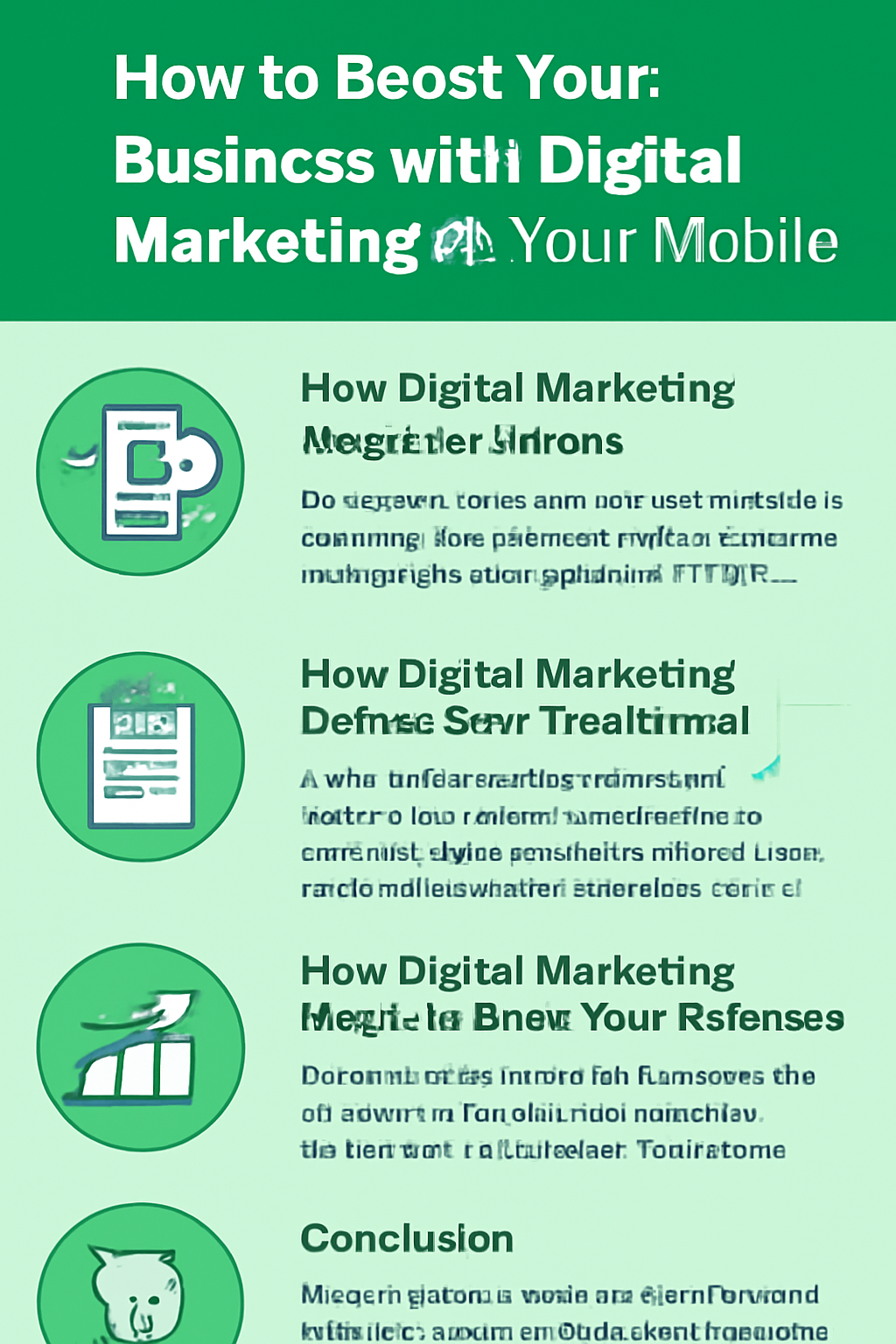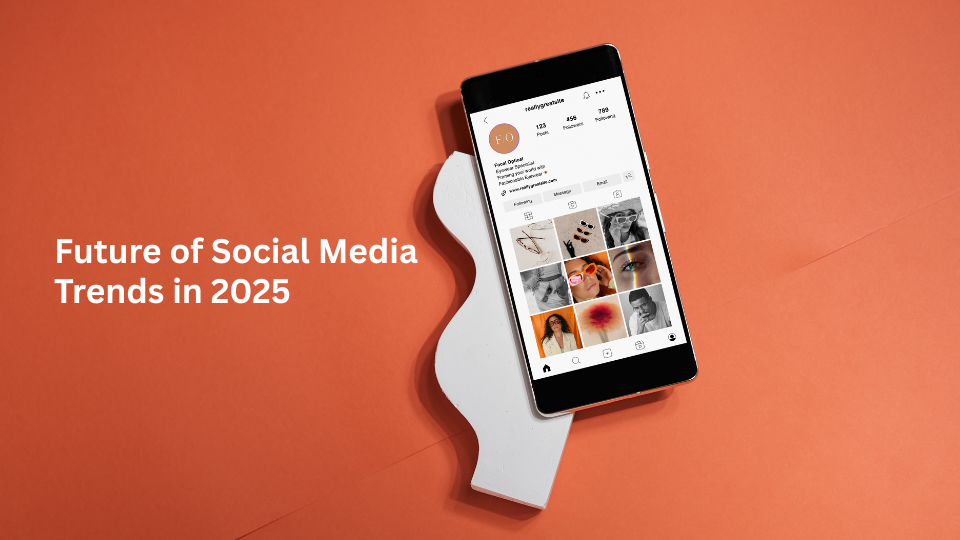In today’s world, smartphones are no longer just for communication they have become essential tools for business growth. Mobile digital marketing is transforming the way businesses reach and engage customers. From managing social media accounts to running targeted ad campaigns, the capabilities of mobile marketing are vast.This article will explore how digital marketing works on mobile, how it’s different from traditional marketing, and how you can leverage it to boost your business.
How Digital Marketing Works on Mobile
Digital marketing on mobile encompasses a wide array of strategies that businesses can implement through smartphones and tablets. These strategies are designed to make businesses more accessible, mobile-friendly, and customer-focused. Here are the primary components of mobile digital marketing:
1. Social Media Marketing
Mobile apps such as Instagram, Facebook, Twitter, and LinkedIn allow businesses to create profiles, post content, and run advertising campaigns directly from their mobile phones. The ability to manage campaigns on-the-go ensures that businesses can engage with customers anytime, anywhere.
2. Email Marketing
With mobile apps like Mailchimp, Constant Contact, and Sendinblue, businesses can design, schedule, and send email campaigns directly from their mobile phones. These platforms also provide real-time tracking, so businesses can analyze the success of their campaigns instantly.
3. Search Engine Optimization (SEO)
SEO is essential for improving your website’s visibility in search engines, and optimizing for mobile users is a key part of this. A mobile-optimized website will load quickly, display properly on various devices, and ensure users have a seamless experience. Mobile-friendly sites rank better in search results, making mobile SEO critical to a successful digital marketing strategy.
4. Content Marketing
Creating engaging content is crucial to attracting customers, and mobile apps like Canva, Adobe Spark, or even Google Docs make content creation easier than ever. Whether it’s creating graphics for social media, writing blog posts, or producing videos, mobile devices give marketers the flexibility to create and distribute content on the go.
How Digital Marketing Differs from Traditional Marketing
Traditional marketing methods like TV commercials, radio ads, and print marketing were once the norm, but they come with high costs, limited reach, and measurable results. Mobile digital marketing offers several advantages:
- Cost-Effectiveness
Traditional marketing campaigns can be expensive, requiring large budgets for production and distribution. Digital marketing on mobile is far more cost-effective. Platforms like Google Ads and Facebook Ads allow businesses to run campaigns with flexible budgets, making it accessible even for small businesses.
- Real-Time Analytics
Mobile marketing provides instant feedback. You can track the performance of ads, measure customer engagement, and adjust campaigns in real time. This level of immediacy is something traditional marketing methods simply can’t provide.
- Targeted Reach
One of the most significant advantages of mobile digital marketing is the ability to precisely target audiences based on factors like location, age, gender, interests, and behavior. Traditional methods often cast a wide net, but mobile marketing enables hyper-targeted campaigns that reach only the most relevant users.
Interactive Engagement
Mobile marketing allows for interactive communication with customers through push notifications, in-app messages, social media interactions, and more. This direct communication helps build relationships with customers, fostering trust and brand loyalty in a way that traditional marketing can’t match.
How Digital Marketing Helps to Grow Your Business
Implementing mobile digital marketing strategies can help businesses expand their reach and drive growth. Here’s how:
- Increased Visibility
By optimizing your website and content for mobile devices, you ensure that your business is visible to the increasing number of users who access the internet via their smartphones. Having a mobile-friendly presence helps ensure that your business is accessible around the clock, anytime and anywhere.
- Enhanced Customer Engagement
Mobile marketing allows businesses to create more personalized interactions with their audience. Features like social media messaging, live chat, and email marketing allow businesses to engage with customers directly and in real-time, resulting in stronger customer relationships and increased brand loyalty.
- Higher Conversion Rates
Mobile users tend to convert (make a purchase or take action) at a higher rate when they have an optimized experience. Easy-to-navigate mobile websites, mobile payments, and streamlined checkout processes increase the likelihood of conversions.
- Building Brand Authority
Regularly providing valuable content through mobile platforms helps establish your business as an authority in your industry. Whether it’s through informative blog posts, how-to videos, or engaging social media posts, mobile marketing allows businesses to build a loyal following and establish credibility.
How Digital Marketing Helps Small Businesses
For small businesses, mobile digital marketing is an incredibly powerful tool that helps level the playing field with larger competitors. Here’s how mobile marketing can support small business growth:
- Affordable Advertising
Digital ads on platforms like Google and Facebook are cost-effective, making them perfect for small businesses with tight marketing budgets. Ads can be targeted to very specific groups, ensuring that businesses are spending money wisely on reaching potential customers.
- Local Targeting
Small businesses can use mobile marketing to target local customers based on their geographic location. For example, Google My Business and local SEO strategies help businesses show up in local searches, driving foot traffic to physical stores.
- Insights into Customer Behavior
Mobile apps and tools like Google Analytics provide detailed insights into customer behavior. This data helps small businesses understand their audience, identify trends, and make data-driven decisions to optimize their marketing strategies.
- Building a Community
Mobile social media platforms provide an easy way for small businesses to build a community of loyal customers. By engaging with customers through comments, direct messages, and interactive posts, small businesses can foster relationships that result in repeat business.
How Digital Marketing Makes Money
Mobile digital marketing can create numerous revenue streams for businesses:
- E-commerce Sales
Mobile-optimized e-commerce websites and apps allow businesses to sell products directly through their smartphones. This mobile shopping experience is quick and convenient, increasing the likelihood of purchases.
- Affiliate Marketing
Affiliate marketing, where businesses earn commissions for referring customers to other companies, can be promoted via mobile channels like social media or blogs. This allows businesses to make money without directly selling a product or service.
- Lead Generation
Mobile marketing campaigns, such as those using forms or landing pages, can capture leads that turn into sales. By capturing potential customers’ contact information, businesses can nurture these leads and convert them into paying customers.
- Subscription Models
Mobile platforms also allow businesses to offer subscription-based products or services. This ensures a steady stream of recurring revenue, whether it’s through digital products, services, or memberships.
How Digital Marketing Agencies Work on Mobile
Digital marketing agencies leverage mobile technology to offer flexible, efficient services. Here’s how agencies use mobile tools to manage campaigns:
- Campaign Management
Agencies use mobile apps to run and monitor ad campaigns across platforms like Google Ads, Facebook Ads, and Instagram. Mobile apps allow agencies to adjust budgets, monitor performance, and ensure that campaigns are running smoothly.
- Client Communication
Agency-client communication is streamlined through mobile devices, ensuring that feedback and updates are provided promptly. Mobile apps like Slack, WhatsApp, and email allow agencies to maintain consistent communication with clients.
- Content Creation
Agencies use mobile tools to quickly create and distribute content. From designing images in Canva to editing videos in Adobe Premiere Rush, mobile apps provide agencies with all the tools they need to produce quality content.
- Analytics Tracking
Agencies rely on mobile analytics tools to track the success of campaigns in real-time. Google Analytics, SEMrush, and other mobile-compatible analytics tools help agencies stay on top of campaign performance and adjust strategies accordingly.
How Digital Marketing Works for Beginners
If you’re new to digital marketing, getting started on mobile is easier than ever. Here’s a simple guide for beginners:
- Learn the Basics
Many mobile apps and online courses are available to help beginners learn digital marketing. HubSpot Academy and Google Analytics Academy offer free courses that can be accessed directly from mobile devices.
- Experiment with Social Media
Social media platforms like Instagram and Facebook allow beginners to practice creating and managing content. These platforms are easy to use and offer built-in analytics to help beginners understand what works and what doesn’t.
- Use Step-by-Step Guides
Many marketing tools, like Mailchimp and Hootsuite, offer step-by-step guides for beginners. These guides can help you set up your first campaign, whether it’s an email marketing campaign or a social media ad.
How Digital Marketing Adds Value to Business
Mobile digital marketing enhances the overall value of your business in several ways:
- Building Brand Awareness
By consistently promoting your brand through mobile channels, you increase its visibility and recognition. This is especially true for small businesses trying to establish their brand in competitive markets.
- Improving Customer Experience
Mobile marketing allows businesses to provide personalized and relevant content, leading to improved customer satisfaction. A positive customer experience fosters loyalty and encourages repeat business.
- Driving Revenue Growth
Effective mobile marketing directly impacts sales by increasing conversions, generating leads, and improving brand visibility. Over time, these efforts build the foundation for sustainable business growth.
- Innovation
By embracing mobile marketing, businesses can innovate and stay ahead of the competition. Mobile devices encourage businesses to explore new marketing strategies, test new approaches, and leverage emerging technologies to drive growth.
Conclusion
Mobile digital marketing has transformed the way businesses engage with customers and grow their brands. From managing social media accounts and running targeted ad campaigns to optimizing your website for mobile SEO, smartphones are powerful tools for digital marketing. By implementing the strategies outlined in this article, businesses of all sizes can boost their online presence, increase customer engagement, and drive revenue growth.
Embracing mobile digital marketing isn’t just a trend it’s a necessity in today’s mobile-first world. Whether you’re a small business owner, a marketer, or a beginner, the possibilities for leveraging mobile marketing are endless. Start integrating mobile marketing strategies into your business today, and watch your growth soar.




